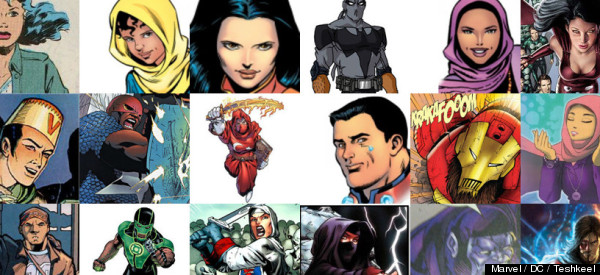On the heels of ReligionLink’s less-than-comprehensive topical overview of religion and comics, The Huffington Post recently made its own attempt. Written by Professor S. Brent Plate, an expert on religion and American visual culture, kept his commentary narrow and targeted on the Judaic elements. While not pioneering new trails in the exploration of the medium (and the superhero genre) in terms of Judaism, Plate does bring the discussion largely up to date on the eve of Superman’s latest film incarnation in Man of Steel. One suspects, though, that if there’s something new or more to say on what Plate calls “the sacredness of superheroes,” it’ll come from outside Judeo-Christian discourse.
Category Archives: cultural
Boston Professor Uses X-Men Character Costume to Illuminate Islamophobia after Marathon Bombing
 In the wake of the Boston Marathon Bombing and capture of suspect Dzhokhar Tsarnaev, Boston University Associate Professor Kecia Ali was invited as a guest blogger for NPR affiliate WBUR’s Cognoscenti where she recounted not only running a 5-kilometer fundraiser with a “Heroes and Villains” theme but also having to convince a fellow runner that her costume as Dust of the X-Men was actually heroic.
In the wake of the Boston Marathon Bombing and capture of suspect Dzhokhar Tsarnaev, Boston University Associate Professor Kecia Ali was invited as a guest blogger for NPR affiliate WBUR’s Cognoscenti where she recounted not only running a 5-kilometer fundraiser with a “Heroes and Villains” theme but also having to convince a fellow runner that her costume as Dust of the X-Men was actually heroic.
Dust, of course, brings the veil front and center. She may be a rare positive representation of a Muslim woman in comic books, but her character is affected by Orientalism and sexism. Does she break down stereotypes, or does she reinforce them?
Ali pointed to an earlier writing by blogger Broken Mystic on the character of Dust and the complexities her portrayals present:
So overall, can we appreciate a character like Dust? I think we can; however, there is a lot of room for improvement. […H]er character is incomplete and her character suffers from stereotypes that are due to misunderstandings about Islamic beliefs and practices.
What with the recent headlines generated by DC Comics’ introduction of Simon Baz as a new Green Lantern, are Marvel Comics readers likely to be reintroduced to Dust anytime soon?
Huffington Post Features Muslim Superheroes — VOTE NOW!
Thirty-two of the comics world’s Muslim superheroes — and who thought there were that many, really? — are profiled in the Huffington Post‘s Religion section, squaring off in March Madness brackets-style.
Characters from Marvel Comics, DC Comics, Teshkeel Media, and a host of other, independent publishers are all featured as readers vote on who will advance to face each other. Which hero has what it takes to be the finest Muslim superhero out there? (And how many did you know already, eh?)
The Tournament will be running all through the NCAA finals into April. Voting is free and open to all!
Batman for only Judeo-Christians, implies politician

In July of 2012, the Huffington Post reported that Representative Louie Gohmert (R-TX) responded to the Aurora movie theater shootings by stating that “the shootings […] were a result of ‘ongoing attacks on Judeo-Christian beliefs.'” These comments from The Heritage Foundation’s “Istook Live!” radio show have some ugly implications to them: not only do Batman movies attract primarily Judeo-Christian audiences (hmm, ok…) but that the victims of the shooting were paying the price for attacks on specifically this theology. Link this to the relatively Orientalist nature of the first and third films’ villains (i.e. Ra’s al Ghul), and there’s a growing strain (see previous “By Rao!” posts) of either Islamophobic or non-ecumenical taint artificially attaching itself to Batman’s mythos.
Rao wants to know: Is Batman becoming associated with a particular faith?
Old Shul Justice

In honor of looking back upon a New Year, Rao wants to call out a writing by Richard De Angelis in June 2011 entitled, “Old Shul Justice.” In it, he looks again at the role(s) of Judaism in the rise and continuation of the U.S. comics medium, particularly through the lens of tikkun olam, “healing the world.”
Additionally, it includes a hugely useful bibliography of texts on Jews and comics (current as of 2011), both done in the comics form and as scholarly prose. De Angelis kindly includes a sample of Fred Van Lente and Ryan Dunlavey’s Comic Book Comics to help initiate the uncertain (as well as to Van Lente and Dunlavey’s wonderful Bad Twin Comics work!).

